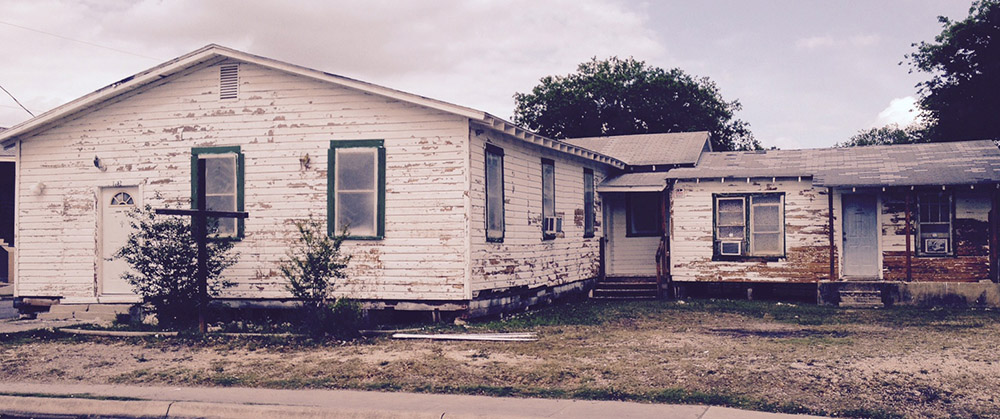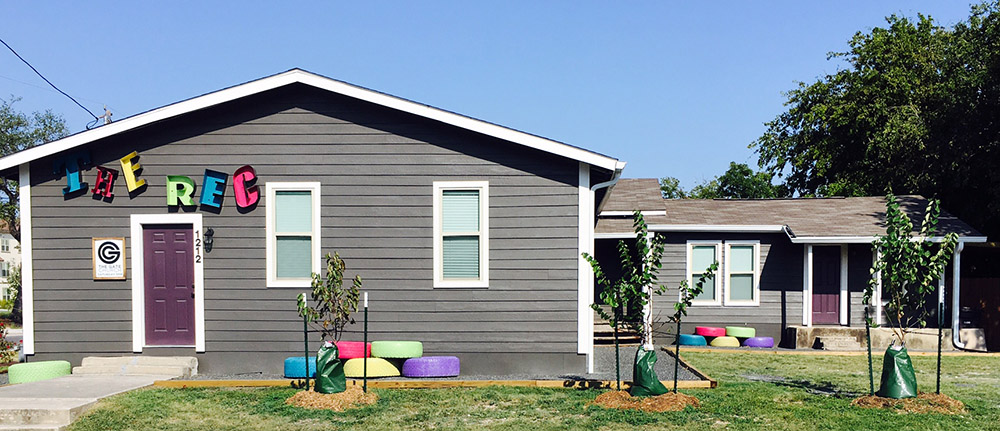Lending a hand where it’s needed most: Why one couple left Stone Oak for the East Side of San Antonio, Texas
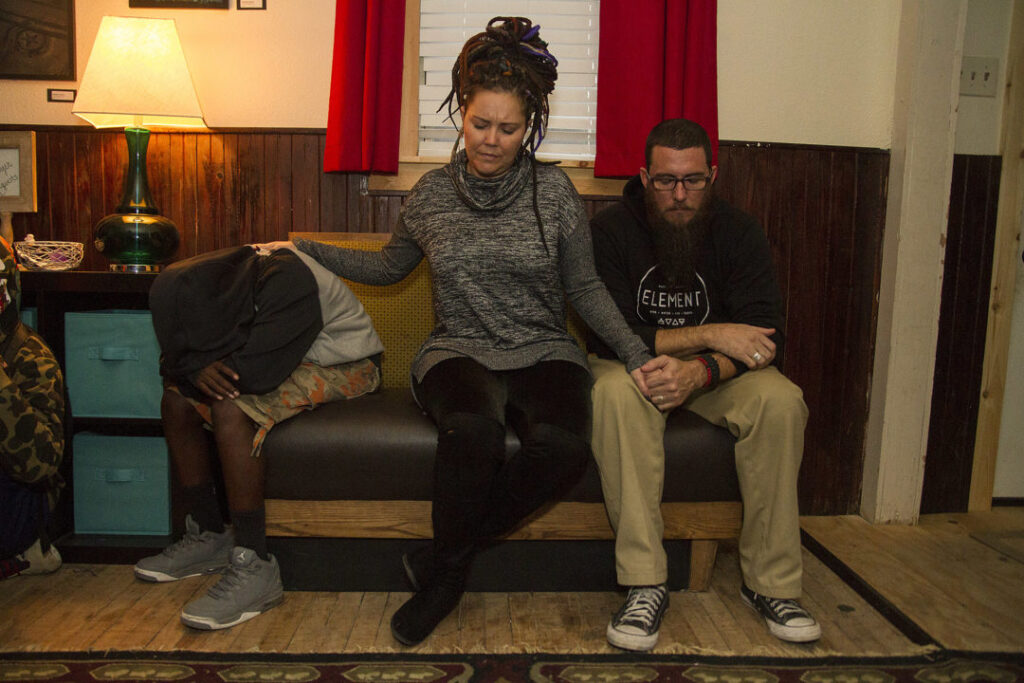
Jennifer and Charlie Foltz holding hands while Jennifer comforts a boy from the neighborhood during church service at The Gate Church
By Darcy Sprague
Four years ago, Charles and Jennifer Foltz moved just about 20 miles. Their old life seems worlds away, because that’s what it feels like when you move from Stone Oak to the East Side and voluntarily take a $100,000 cut in your income.
These days, the Foltzes spend their time campaigning to save the local elementary school. They revived a former black church next to East Meadows, the former Wheatley Courts, and also turned it into a recreation center. They also own and manage several duplexes and rent them to low-income individuals.
The couple, who are in their 40s, are homeschooling preteens, raising a baby they adopted, feeding their neighbors and helping people get off the street.
“All this stuff that, when you would be living on the Northside you would have no awareness or clue as to the reality of it,” Charles Foltz, 42, said, “and you basically don’t believe it.”
The pair run SA Heals, an East Side nonprofit a block south of East Meadows in the heart of Eastpoint, the area where the federal Choice and Promise grant initiatives have taken shape.
The stats for this area, bookended by downtown and the AT&T Center, are grim: 48.9 percent of people in the census block (1306) live below the poverty level; 43.1 percent of adults didn’t graduate from high school; and the average household income is $21,678, according to the American Community Survey.
“The system is so stacked and the obstacles are so great that it takes monumental efforts to break cycles and get out,” Charles Foltz said. Jennifer Foltz, 46, adds, “It’s not our responsibility to fix anyone; we are just supposed to love them. (Fixing them) is God’s job.”
Charles Foltz was a divorced dad of two boys — now 11 and 14 — and president of the Wilderness Oak Elementary Parent Teacher Association, an affluent school in North East Independent School District. He has a Ph.D. in interdisciplinary molecular and cellular biology, and worked as a professional triathlon and strength and conditioning coach.
He said when he saw how much worse off other NEISD schools were, and how little his PTA cared — they gave just $250 of their $65,000 budget to their struggling sister school, he said — he was motivated to help. At the same time, he also connected with his faith.
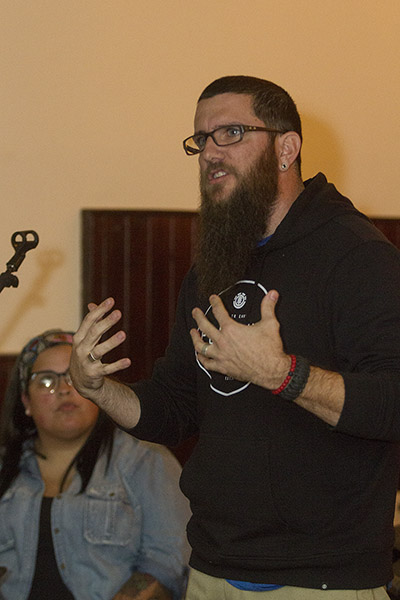
“That was my first introduction to inequity and disparity … though I wouldn’t have used those words back then,” he said. “That’s what started this mindset to redistribute. I didn’t know anything about anything, but it was really a gut reaction that this wasn’t right.”
In late 2013, he married Jennifer, whom he met while she was teaching at Wilderness Oaks Elementary School. They tied the knot in November, around the same time they ended up worshipping at God’s Place, a small black church on the East Side, by a friend’s recommendation. They felt drawn to the church and decided to open a children’s ministry there.
The newlyweds began discussing structural inequity in the city and the hypocrisy they see in Christian churches that are quick to take service trips to Mexico, but slow to make an everyday investment in the community around them, they said. Four months later, they moved into a duplex a block west of God’s Place without much of a plan. When the church decided to leave that location, the Foltzes stayed with the community.
Photos provided by SA Heals show how the former God’s Place church was transformed into a community center. Courtesy Photos
The first night in their East Side duplex, the couple expected gunshots and sirens, like something out of a TV show, but the neighborhood was quiet.
Jennifer Foltz laughs now about how she used to pretend to be on her phone while driving through the neighborhood on the way to the AT&T Center, just a few years back, because she thought it would prevent her getting carjacked.
People thought they were cops. Others would try to steal from them or offer them lifted goods. One man asked for a ride, then requested Charles Foltz’s socks.
The couple found their foothold in the community by volunteering at Booker T. Washington Elementary School. They mentored kids, created a leadership program and launched a weekend feeding program. Eventually, their efforts to help the community morphed into SA Heals, a nonprofit funded through private, church and business donations.
They knew it would take about a year to earn the school’s trust, because low-income schools see churches come in and out so often.
Now the Foltzes pay a woman, Franchesca Garcia, 31, to assist Booker T. Washington full time. She runs SA Heals’ leadership program and assists parents in getting the supplies their children need, among other duties.
“A lot of these kids are angry and hurt and they feel uncared for,” Garcia said. “I come from a broken home, so this isn’t very different for me … I can relate to the sadness and pain.”
The Foltzes have become so close to some of the children and their families that last fall they began homeschooling four struggling middle school children.
“We don’t believe we are the ones to change the neighborhood,” Charles Foltz said. “We think it will be one of the kids we raise up.”
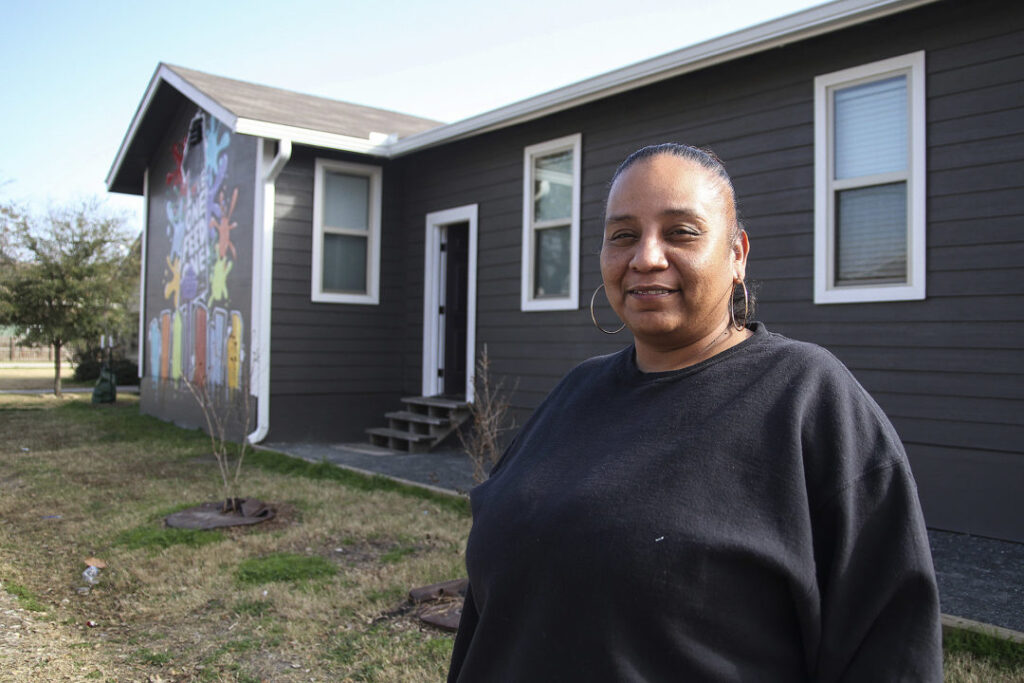
One of the boys the Foltzes homeschool is Ashton Harris, 13. They met him while he was attending Washington, where he had trouble focusing, and was struggling to read and write.
His mother, Ernestine Harris, 39, said he has already improved in the year he has been homeschooled by the Foltzes.
“They’re some awesome people. I love them,” Ernestine Harris said. “They make you feel so secure.”
She met the couple when her children — ages 13, 15 and 18 — began telling her the Foltzes let people hang out at The Rec after school and play basketball on the court between The Rec and H.I.S. BridgeBuilders, another Christian nonprofit on the same block. Prior to the Foltzes moving in, Harris would not let her children outside without her supervision.
Ernestine Harris is married, but currently separated. Since she had her first child at 21, and has been struggling to maintain a steady, full-time job and remain in a stable housing situation as she has raised her kids almost entirely by herself.
Recently, she was cleaning homes part time, barely scraping by. She wanted to find another job, but started to feel like her situation was hopeless. She said support from the Foltzes kept her motivated, and just this week she found a full-time job at a warehouse with benefits.. . .
One fall night in 2014, the Foltzes were sitting in their backyard with some of their neighbors when they realized a lot of foot traffic happened on their street. They thought to themselves, “Maybe we should barbecue and offer everyone that passes food.”
People thought they were crazy and started avoiding their street.
Jennifer Foltz stood in her backyard when families she recognized passed by so she could greet them. Slowly, seeds of goodwill blossomed into friendship and trust.
“People would say, ‘Go find the man with the long beard’ or ‘Go knock on that door, they will help you’,” Jennifer Foltz said.
This eventually morphed into a backyard church called The Gate, which has now moved into The Rec.
“It would have been almost impossible for me to fail in life. Some people work harder than me and still can’t get ahead. — Charles Foltz
“There are plenty of churches for people who have it together, who are struggling, who do their whole Sunday best thing,” Charles Foltz said. “That’s not our church.”
At a recent service, at least three people in the crowd were shaking. One woman alternated between dancing and crying. Several middle school-aged children snuck in the back as the service progressed so they could get food when it was over. They get an eclectic mix of drug addicts, prostitutes and families. Sometimes the dining-style booths and metal chairs in the church are full, other times it’s just Jennifer Foltz in the audience.
Charles Foltz called a young woman up to recognize her 16th birthday and said a prayer over her.
They fed the group chili, corn chips and soda.
“It’s more faith in action,” Charles Foltz said. “Like we are going to love you, then we are going to forgive you, then we are going to love you again, and we are going to do it again and again and again because that is what God does to us.”. . .
In 2015, they asked the landlord of God’s Place if they could use the building after the congregation vacated it. He allowed them to, as long as they fixed it up.
They opened up The Rec and eventually got the community to help them do the repairs. One day, they set up a snow cone machine in the front yard.
“Hey, do you want to come inside to our rec center?” Jennifer Foltz would say while standing outside.
It worked. Slowly more children and families started interacting with the couple.
Eventually, they bought several duplexes from the same landlord and now rent them to low-income housing tenants. They always reserve one unit for people who are in dire need of help, and only charge them what they can afford to pay.
In 2015, they met two pregnant women addicted to drugs, and they tried to provide a safe place to stay, food to eat and access to medical care for the women. The coupled adopted one of the babies, who is now 2.
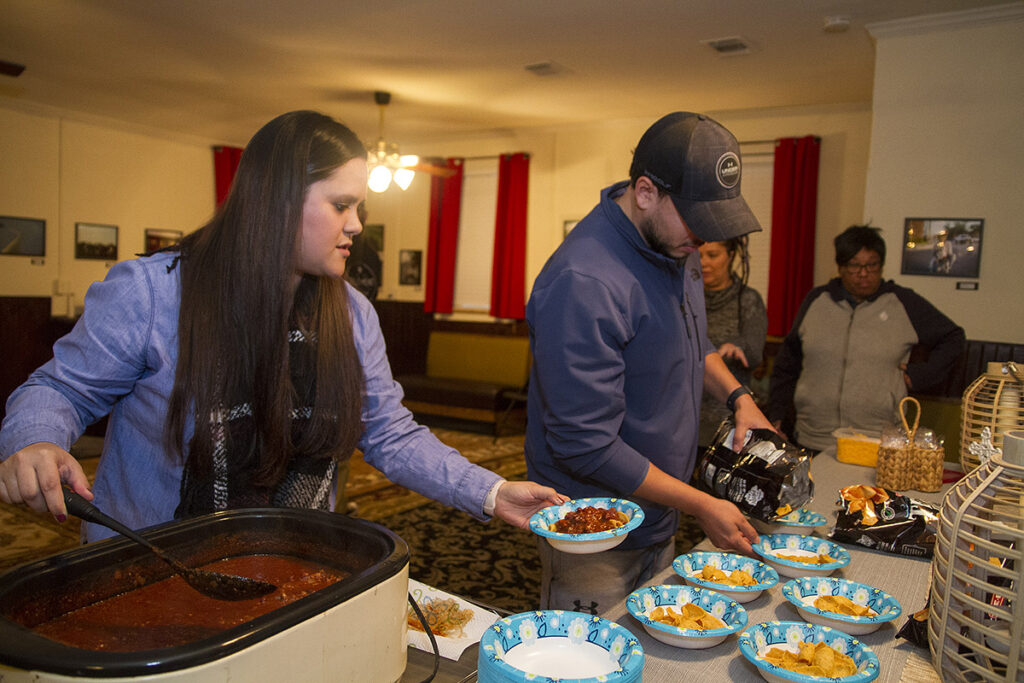
The church service is every Saturday at 5 p.m. followed by a meal.
Charles Foltz said he is not sure if the difference in race or socioeconomic class made it harder for them to fit in the neighborhood and discover the right way to help.
The Foltzes are white in a 96 percent-minority neighborhood, are within the 1 percent of residents that have postgraduate degrees and are within the top 10 percent of income earners, according to the American Community Survey.
“It would have been almost impossible for me to fail in life,” Charles Foltz said. “Some people work harder than me and still can’t get ahead. It would be wrong for me to say, ‘Just go get a job,’ because they don’t have access to the education and the support system I do.”
By Darcy Sprague
The couple has been in the neighborhood for four years now. They feel like they have surpassed any early expectations they had for themselves.
Their biggest achievement is feeling like they belong within the community. Their neighbors watch out for them, and take care of the couple any way they can, the Foltzes said.
Jennifer Foltz added that they’re no longer the church people; now they are just Charlie and Jen.
“It’s not like the Northside, where people just drive in to their three car garages without saying anything,” Charles Foltz said. “Everyone here is close.”
Republished with permission from FoloMedia.com under a creative commons license.

